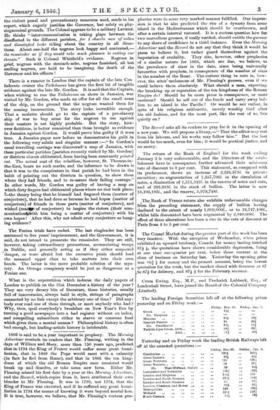There is a rumour in London that the captain of
the late Con- federate cruiser the Tallahassee has given the first bit of tangible evidence against the late Mr. Gordon. It is said that the Captain, when wishing to run the Tallahassee on shore in Jamaica, was visited by Mr. Gordon, who made an offer for all the small arms of the ship, on the ground that the negroes wanted them for the coining insurrection. The story looks incredible enough. That a mulatto should go to the captain of a pro-slavery ship of war to buy arms for the negroes to use against their masters is not highly probable. But the story, how- ever fictitious, is better conceived than those brought as evidence in Jamaica against Gordon. It would prove him guilty if it were true. A Jamaica paper now before us demonstrates his guilt in the following very subtle and singular manner :—" In Gordon's usual travelling carriage was discovered*.a map of Jamaica, with these particular parishes [parishes recently visited by Mr. Gordon] or districts almost obliterated, from having been constantly pointed out. The actual seat of the rebellion, however, St. Thomas-in- the-East, bears no such marks, and the inference to be drawn is that it was to the conspirators in that pariah he had been in the habit of pointing out the districts in question, to show them where they had friends, and to re-assure their failing courage." In other words, Mr. Gordon was guilty of having a map on which dirty fingers had obliterated places where no riot took place; 1—the theory being that he himself had fingered them (matter of conjecture), that he had done so because he had hopes (matter of conjectuie) of friends in those parts (matter of conjecture), and wished (Inatilprof conjecture) to inspire the rioters (their corn- raunicationctirith him being a matter of conjecture) with his own hopes ! After this, why not admit every conjecture as hang- ing evidence?




































 Previous page
Previous page